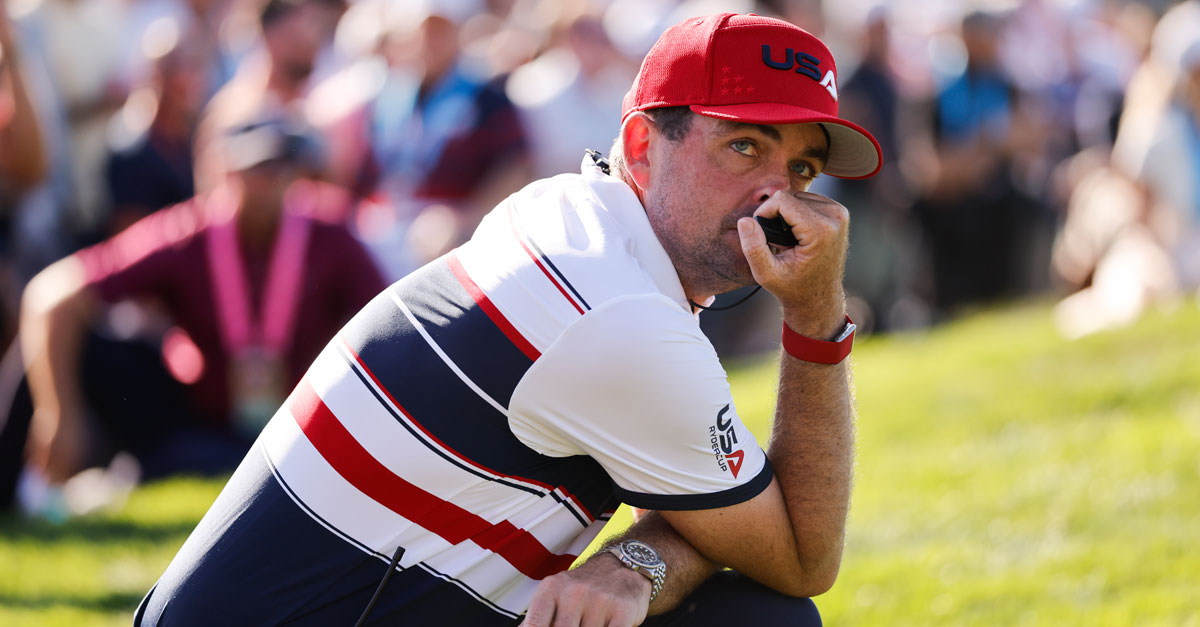“We needed to make more putts.”
Justin Thomas said it after the Americans’ near comeback, and it will be the refrain for those eager to exonerate Keegan Bradley’s captaincy. After all, six of the top seven putters at the Ryder Cup were on Team Europe, and eight of the 10 worst putters were American, per Data Golf. Both can be true: the Americans didn’t play well enough, and Bradley didn’t demonstrate command of the decision-making elements required to win at the margins.
A sampling of the decisions or quotes from captain Bradley that deserve scrutiny:
1. The infamous Morikawa/English foursomes pairing. The curious pairing of Collin Morikawa and Harrisi English faced appropriate public backlash. Any casual golf fan with a rudimentary understanding of pairings strategy raised their eyebrows at the move to trot out two of the weakest players on the American roster in alternate shot. Twice! Had the duo earned two points, we wouldn’t be talking about the foolishness of this pairing. But the blowback here is warranted.
2. “I think historically we play faster greens on the PGA Tour than they do.” This quote from Keegan on Saturday evening is a head-scratcher. Every golfer on Team Europe plays a full-time schedule on either the PGA Tour or LIV Golf, and many have residences in the United States. Perhaps the American golfers expressed a preference for faster greens, but the quote doesn’t inspire confidence in Bradley’s understanding of the players on each side.
3. Chopping down the rough. Bethpage was set up so that the cut-down rough presented virtually no penalty. In justifying the decision to cut the rough short, Bradley explained, “We thought this was the best way to set the golf course up to win. You look at past Ryder Cups, and that’s kind of how it goes.” Is this a reference to…Hazeltine in…2016? When each team’s composition was completely different?
{{inline-article}}
Given the balanced nature of each team’s skill sets, the decision to shorten the rough shouldn’t be raked over the coals, but again Keegan’s rationale doesn’t exactly suggest he knows how to make these kinds of decisions. Moreover, it’s reasonable to question a setup decision that muted the strengths of America’s best player, Scottie Scheffler, one of the most accurate drivers of the golf ball in the world. I don’t think Rory McIlroy minded a setup that allowed him to bash driver around freely. To his credit, Bradley acknowledged that the golf course setup was a mistake.
In totality, Bradley’s captaincy shouldn’t be viewed as a colossal failure, nor should the American loss be chalked up to putting randomness. Keegan avoided many of the pitfalls of past American failures, making intelligent captain’s picks based on merit and getting buy-in from the American players to get competitive reps at the Procore Championship, for example. In the postmortems that will be written and discussed over the ensuing days and weeks, I suspect far too much blame will be placed at the feet of Bradley, whose decision-making is worth scrutinizing while keeping the scale of his blunders in check. Had Scottie Scheffler played three days anywhere near his usual standard, we could very well be talking about an American success story.
The unsatisfying reality is that all of the oft-discussed problems with the Americans are true. Their top golfers rarely seem to deliver their best performances at Ryder Cups. And there doesn’t appear to be much golf intelligence on the decision-making front, especially compared to the consistent proficiency on the opposing side.
Looking ahead to 2027, we’ll see what answers the Americans come up with as they attempt their first road Ryder Cup victory since 1993 at the Belfry. What remains to be seen is who on the American side even knows enough to ask the right questions.








